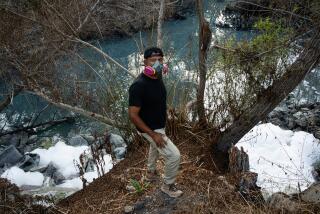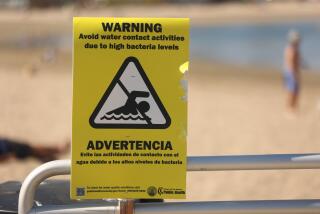Pollution Cited for Swim Ban at Beach
For the first time on a Santa Monica Bay beach, swimming has been banned within 100 yards of where a major storm drain enters the ocean because testing found the water polluted with sewage containing human viruses.
The city of Santa Monica’s decision to prohibit swimming on a popular stretch of beach near the Pico-Kenter storm drain followed disclosure last week of an unprecedented study that found the presence of human enteric viruses.
The viruses, which can cause illness ranging from stomach flu to hepatitis, were detected in samples taken on 11 days over 15 days of testing last summer where the drain enters the bay at the foot of Pico Boulevard.
Although Los Angeles County health officials played down the potential health risk and considered possible changes in the wording of warning signs, Santa Monica took action. The city posted its own large black-and-white signs in English and Spanish along the beach 100 yards north and south of the drain’s entry point.
“Swimming within 100 yards of the storm drain outlet is prohibited,” the signs read. “Storm drain waters may be contaminated with human disease carrying bacteria or virus or hazardous chemicals washed down from urban areas.”
Buoys were placed offshore to designate the area where swimming is banned.
Parts of the bay have been off-limits to swimming when storms have caused Pico-Kenter and other drains to flood. But this is first ban not connected to a storm or sewage spill, officials said.
“It was appropriate to be conservative with respect to public health,” Santa Monica Mayor Dennis Zane said. “We are very concerned there are additional forms of contamination at the storm drain that heretofore had not been acknowledged.”
The stark warning signs have had an immediate impact since they were erected last week. On the eve of the busy July 4th holiday, the often-crowded stretch of beach was mostly empty.
To underscore its belief that the public should not swim near the drain, the environmental group Heal the Bay plans to hold a rally at the site this morning at 11.
Heal the Bay’s staff scientist Mark Gold, who was the principal investigator on the study, praised Santa Monica officials for acting swiftly to ban swimming. “What they did was extremely responsible,” Gold said. “There is no way you can go to the beach there and not know that there is a problem.”
The $125,000 study conducted by the Santa Monica Bay Restoration Project was the first of its kind in California and possibly the nation, director Catherine Tyrrell said.
Samples taken last August and September from the drain, which carries street runoff from Brentwood and Santa Monica, were tested for human enteric viruses.
Tyrrell said the results showed evidence of viruses from human fecal contamination in the storm drain. The report speculated that the most likely sources of the waste are illegal sewage connections to the storm drain, leaking sewer lines or the local homeless population. Members of the federal and state-funded project agreed that the information should be made available to the public.
With holiday crowds expected, Santa Monica City Manager John Jalili decided that swimming should be banned in the immediate area near the drain. “We felt that it was a prudent thing to do until more information becomes available,” Jalili said.
The findings have sparked concern in Santa Monica’s tourist industry.
Beverly Moore, executive director of the city’s Convention and Visitors Bureau, concurred that the public should not swim within 100 yards of a storm drain or two days after a storm.
But with the summer tourist season in full swing, Moore took pains to point out that “the bay is swimmable and our beaches are safe. . . . We want to make sure that the public knows the areas that are safe to swim in and the areas that are not safe to swim in,” she said.
The distinction is important because Santa Monica draws 2.5 million visitors a year and tourism contributes substantially to the city’s economy. The affected area of the beach is immediately in front of the construction site of the Park Hyatt Hotel, which is scheduled to open late this year.
County officials expressed surprise at Santa Monica’s decision.
Jack Petralia, director of the Health Services Department’s Bureau of Environmental Protection, said he could not remember swimming ever being banned near a storm drain.
Petralia and other county officials downplayed the health risk of swimming near the drain’s discharge point. “There is no indication that there is any great risk being in that water,” he said.
He said, however, that a full epidemiological study needs to be conducted.
More to Read
Sign up for Essential California
The most important California stories and recommendations in your inbox every morning.
You may occasionally receive promotional content from the Los Angeles Times.










